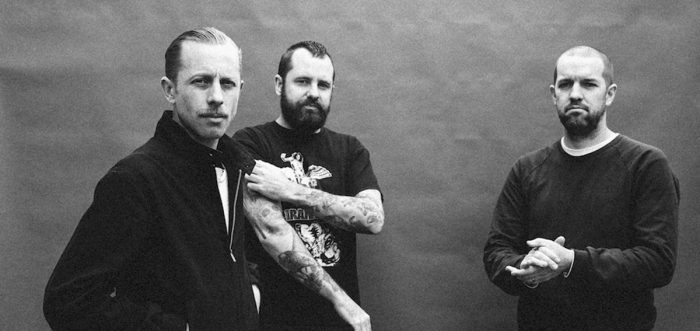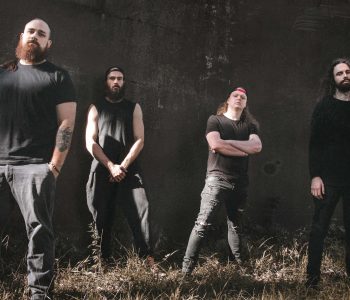As Flaming Wrekage’s brutal fourth album tickles your earholes, you know this is something special. …

As The Smith Street Band wrap up their Death To The Lads tour, Tom Jenkins explains why the decision to put The Nation Blue on the lineup is so important.
I first saw The Nation Blue play with 28 Days and a handful of younger local bands at a community festival in Croydon in early 2003, when was 16. Croydon is deep in the suburbs east of Melbourne and half an hour west of my hometown of Emerald, and in an age before Facebook, Bandcamp or even MySpace, seeing a band like 28 Days at the height of their rap-rock career was a big deal.
The pop punk juggernaut in Australia ws at its peak. Bands like Bodyjar, Gyroscope and Kisschasy would’ve been selling CDs by the truckload. Discmans were blasting them at skate-parks around the country, fuelled by the success of their American predecessors in the 1990s.
It’s not like there wasn’t underground music going around then. Bands like Mindsnare, Magic Dirt and Blood Duster were all prominent. However, to kids like me who were too young to get into pubs and lived 40-odd kilometres away from the closest decent record store, underground music was completely inaccessible. Sure, there were compilation CDs and the odd appearance on rage, but the labels were pushing a hot new single called Rip It Up and you best believe that’s what we did. As a result, I was more than happy to make the trip on public transport to watch 28 Days play their hits to an enthusiastic mosh pit of kids in wallet chains and brightly coloured Etnies shirts.
The Nation Blue make abrasive music; sometimes with no chorus, sometimes brooding and ugly, sometimes with glimpses of hope shining through a wall of noise. Frontman Tom Lyngcoln writes smart, passionate songs that are at times confronting and brutal but always thought provoking and unyielding.
However, as a teenager watching them play on a rugby field in Croydon, I couldn’t process any of that. I was there to see 28 Days do some punk jumps and I got blasted with a bleak, pulsating, thunderous hammer for 25 minutes. It was uncomfortable, it was harsh and it didn’t fit within the musical theme of a community festival, but it opened up a whole new musical world to me.
On face value, the decision to include The Nation Blue on their “Death To The Lads” tour may seem odd. A lot of the fans that attend a typical “Smithies” concert these days would be on the younger side of 21 and may have ended up there after seeing one of their appearances at Laneway Festival, Falls or with Violent Soho. But as I reminisce about my early days in the music scene, it makes more sense than ever.
Thanks to my parents, my knowledge of Australian rock music growing up was vast. I have fond memories of looking carefully through their partially abandoned vinyl collection and finding beautifully packaged copies of Midnight Oil’s Red Sails in the Sunset complete with a huge A3 poster insert of the intense cover art and in-depth liner notes. I remember staring in wonder at Cold Chisel’s Circus Animals trying to work out exactly where the location of that caravan might have been and just how lonely the whole thing appeared.
I loved that music back then for the melody and the blaring guitar solos, but mostly for the familiarity that (still outstanding) bands like Creedence, Rod Stewart and The Beatles just didn’t provide. It was only later in life that I was able to resonate with any politics that music presented to me.
When The Nation Blue announced earlier in the year that they would be finally be releasing two new albums after a lengthy hiatus, I and many other people were excited to see the band return. It’s rare to see a band release two (!!) albums after almost two decades together rather than announcing another “reunion tour” which mostly involves playing a much-loved album from the glory days and selling four different t shirt designs.
While they were on that break their former Poison City label-mates The Smith Street Band have made a name for themselves, selling out huge shows around Australia and touring constantly around the world to much success. Having grown up in the same area as frontman Wil Wagner, he no doubt shares many of the same experiences of living in the outer suburbs of Melbourne as an underager.
On face value, the decision to include The Nation Blue on their “Death To The Lads” tour may seem odd. A lot of the fans that attend a typical “Smithies” concert these days would be on the younger side of 21 and may have ended up there after seeing one of their appearances at Laneway Festival, Falls or with Violent Soho. But as I reminisce about my early days in the music scene, it makes more sense than ever.
Wil writes familiar, passionate songs that resonate with a multitude of people, but will also drop the occasional hint to Punt Road or hills in Hobart harbour before dropping into a massive chorus. This formula has seen them go from playing floor shows to headlining enormous stages in a relatively small amount of time and with that workhorse mentality they deserve every piece of success they get.
As time went on, the dots while listening to those old Midnight Oil records started to connect. I identified with the politics and the sounds for the first time in my life. Old cult films like Stone and Wake in Fright made more sense to me and I realised that when it really comes down to it, Australian music doesn’t need to sound like whatever is in vogue and half a decade late—even if it is as something as exciting and commercially attractive as skate punk in the nineties. Out accent is ugly and our surroundings, especially in the modern political climate, are even uglier. Our landscape and history is desolate, bleak and haunting but there is beauty in segments of it. So it would make sense that our music reflects that.
Maybe it’s the cynicism in me as I race towards thirty, but hopefully there are a few ‘kids’ in the crowd at these very large shows that take away as much as I did and connect those same dots, not only with The Nation Blue, but the The Smith Street Band. There’s probably some irony in using such depressive metaphors when the music industry in such a grim state, but capturing our culture as a whole, whatever state it’s in, is important for so many reasons. You can only write so many songs about drinking beers on the beach and “chilling out”.
The Smith Street Band’s Death to the Lads tour concludes tonight in Melbourne, at a sold out Corner Hotel.



